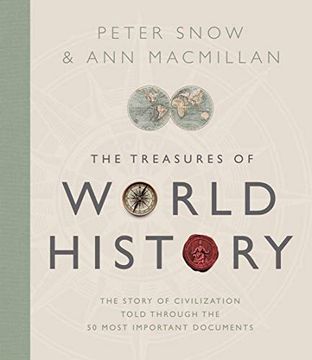Treasures of World History: The Story of Civilization in 50 Documents (en Inglés)
Reseña del libro "Treasures of World History: The Story of Civilization in 50 Documents (en Inglés)"
50 of the most fascinating documents in the history of humankind are beautifully reproduced from national archives and museums around the world - with commentary explaining why the documents are so significant, and how they have shaped or changed the course of history. This is a spirited examination of world history, told through key documents, by two celebrated historians and journalists. With a wealth of experience between them on political, social, cultural and military history, and today's current affairs. Peter Snow and Ann MacMillan are the perfect guides to appreciating the significance of each document. Chapters are devoted to each of the 50 documents across the political, military, artistic, and scientific spheres, and supported by additional contemporary images. The documents themselves have been researched from the collections of national archives, museums, libraries, and private collections around the world. The authors explain their criteria for selection and provide the pertinent details of each one, taking us on a journey from the scripts of the earliest civilizations through to momentous speeches and papers of today. The 50 documents range from Hammaburi's Code, one of the earliest examples of a complete written legal system from around 1750 BC, all the way to a twenty-first century map of the "Nearby Universe". A diverse range of historically significant moments are touched upon, with other documents including The Declaration of Independence, Nelson Mandela's Courtroom Speech and Albert Einstein's General Theory of Relativity, as well as key cultural artefacts such as Woodstock 1969 tickets and the itinerary of the Beatles' 1964 North American tour. The collection is divided into four sections, covering respectively the Bronze and Iron Age (1800BC-AD100), the Medieval and Early Modern Period (600-1648), The Age of Revolution (1776-1893), and The 20th Century and Beyond, as well as an insightful introduction from the authors where they explore some of their decisions in choosing documents, and even their definition of a document itself. The book also includes a foreword from historian Dan Snow, who has researched, written and presented several documentaries and appears regularly on the BBC, and is also the son of Peter Snow and Ann MacMillan.

